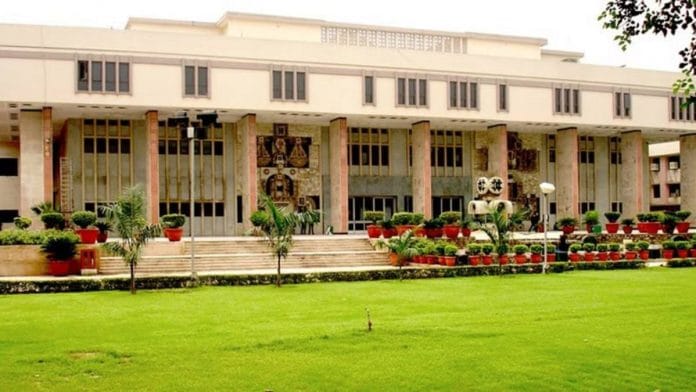New Delhi: Noting that there are several terrorist organisations operating in India, the Delhi High Court said in a ruling last week that supporting such a group, either monetarily or by facilitating their meetings, is “clearly prohibited” under the Unlawful Activities (Prevention) Act, 1967.
Saying that Sections 38 and 39 of UAPA deal with the membership of terrorist organisations and extending support to them, a bench of Justices Prathiba M. Singh and Amit Sharma ruled on 10 January that support “could include monetary support, assistance in arranging meetings, managing meetings to support or furthering the activity of the terrorist organisation, receiving money which could be used for terrorism, etc.”
In the present case—Zafar Abbas vs National Investigation Agency—the two-judge bench was dealing with a petition filed by seven persons accused under various provisions of UAPA and Indian Penal Code (IPC).
According to NIA’s case, these accused persons were an active part of Lashkar-e-Taiba (LeT) in India, and were allegedly furthering its activities. Moreover, the plan of the accused was always to commit terrorist attacks in the country, the agency told the court.
The accused had approached the high court to set aside an order passed by the district court in August last year, denying them bail for offences under the IPC, like criminal conspiracy, waging, or attempting to wage war, or abetting waging of war, against the Government of India, and conspiracy to commit offences punishable under Section 121.
The FIR registered against the accused had also accused them of committing offences under UAPA Sections 17, 18 and 18B, which entail the various punishments for raising funds for a terrorist act, conspiracy, and other related activities, and recruiting people for terrorist acts.
Apart from this, they were also alleged to have committed offences under Sections 38 and 40. While the former relates to membership of a terror outfit, the latter deals with the offence of raising funds for such groups, and prescribes a maximum punishment of 14 years for the Act, or fine, or both.
Also Read: Supreme Court keeps ‘close watch’ on Sambhal, bars revival of well in disputed Shahi Jama Masjid
Who is a member of a terrorist organisation?
Section 38 of UAPA says that a person “who associates himself, or professes to be associated, with a terrorist organisation with intention to further its activities, commits an offence relating to membership of a terrorist organisation” is deemed to be a member of such an outfit.
However, this provision does not extend to a person who can prove two things—that the outfit was not declared a terrorist organisation at the time when the person became a member or began to profess to be a member, and that the person did not participate in the its activities while it was considered a terrorist organisation and was included in the First Schedule of the Act.
The First Schedule, which has been amended a few times, presently includes around 45 such terrorist organisations, such as Lashkar-e-Taiba, Khalistan Tiger Force, Communist Party of India (Maoist) and all its forms, the Tamil Nadu Liberation Army, and some obvious ones like the Al Qaida, Jamiat-ul-Mujahideen, People Liberation Army, and others.
Membership of one of these organisations, or even of an organisation that operates under the same name as these outfits, is an offence under Section 38 of the UAPA.
What amounts to supporting a terrorist organisation?
Under Section 39 of UAPA, a person is said to have committed the offence of supporting a “terrorist organisation”, if they—“with intention to further the activity of a terrorist organisation”—invite support for it, and such support is not restricted to providing money or any property. Section 40 demarcates the offence of raising funds for such terrorist organisations and punishes the same.
Another situation under which one can be held for this offence is that of arranging, managing or assisting a meeting, “with intention” of furthering a terrorist organisation’s activity.
However, certain ingredients must be met to invoke Section 39 (b), including that the person facilitating such a meeting “knows” that it is to support such an organisation or further its activity, or is to be addressed by someone who associates or professes to be associated with such organisations.
It is to be noted that the ingredient of “intention” is very important for the offence to be committed under these sections.
Court’s judgment in present case
Denying bail to the accused, the bench said that in today’s world of global communication, a meeting need not just be a physical meeting.
“It could even be meetings, arrangement or management of meetings through electronic/digital platforms, through electronic communication, etc,” the court said, adding that when a terrorist organisation, like LeT, is involved, which has already taken responsibility for different terror acts in the country, any “tacit or active support” cannot be taken lightly.
The court flagged the modus operandi usually adopted by such organisations as one that includes recruitment of youngsters, funding of terror by opening fraudulent bank accounts, use of digital devices for enabling communication and networking of the terrorist organisation, coordination with handlers located abroad, including in countries like Pakistan, etc.
“These organisations have caused immense harm, damage and loss to human life, institutions, destruction of property,” the court said, dismissing the pleas. It also emphasised that UAPA is a statute, which permits various measures to be taken against terrorists and terrorist organisations, including freezing of assets to protect the country and for prevention of terrorist acts from occurring.
(Edited by Mannat Chugh)






